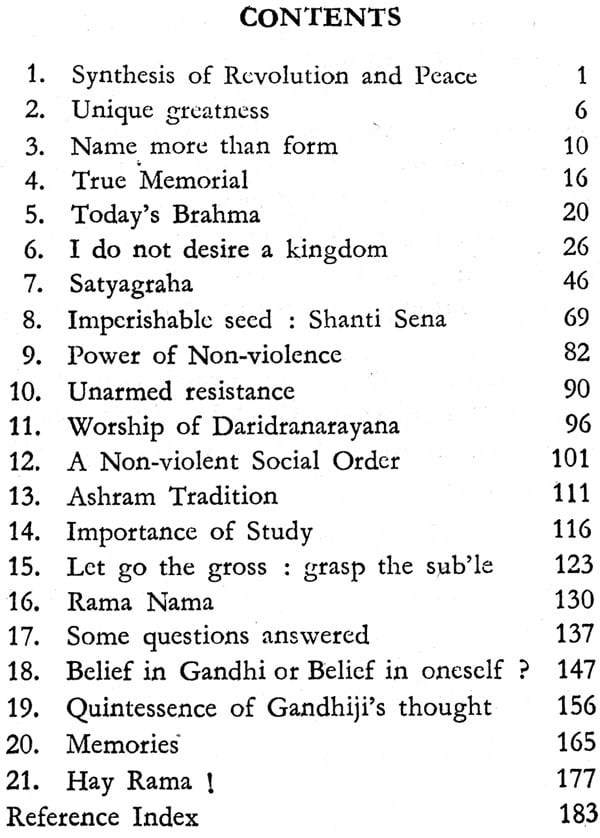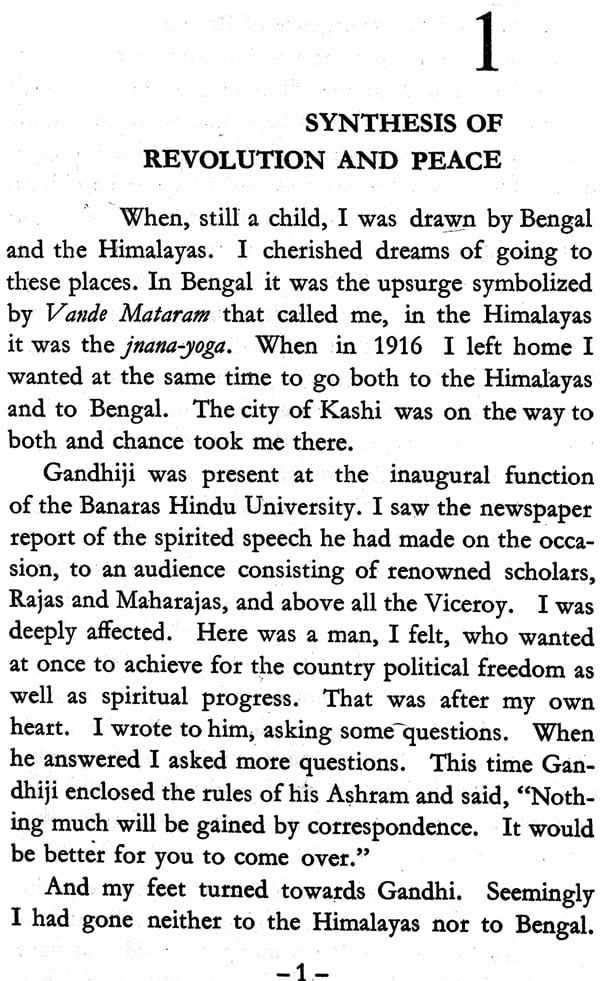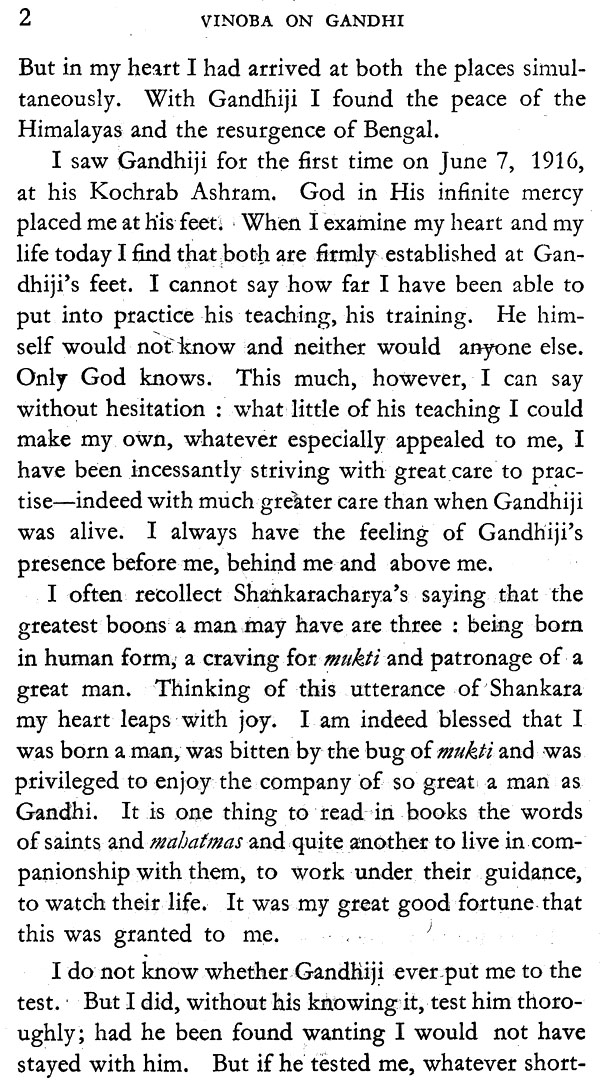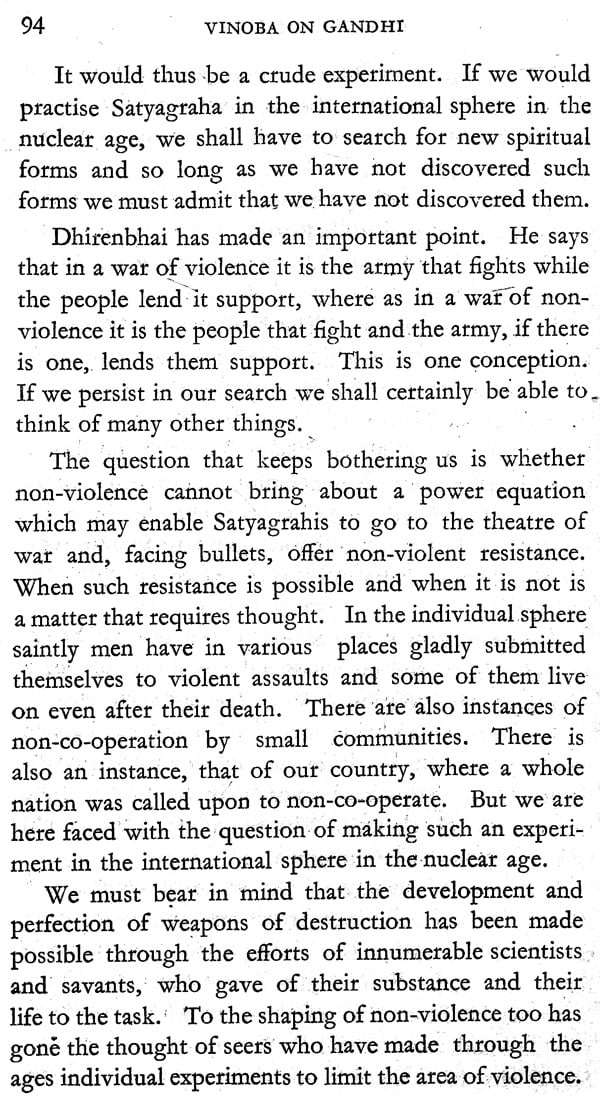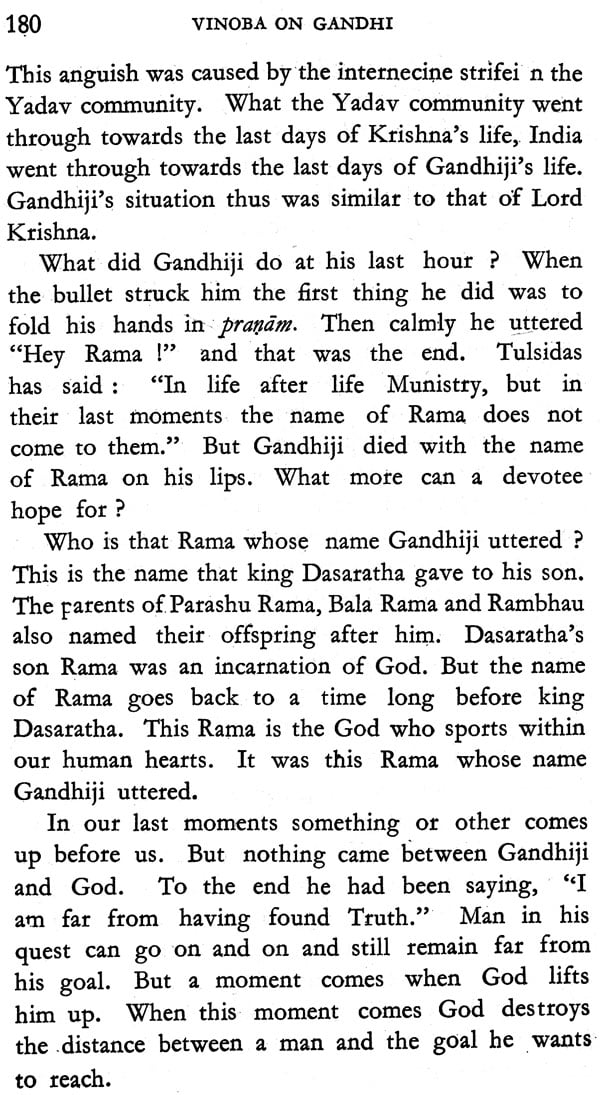
Vinoba on Gandhi
Book Specification
| Item Code: | NAV465 |
| Author: | Kanti Shah |
| Publisher: | Sarva Seva Sangh Prakashan, Varanasi |
| Language: | English |
| Edition: | 2011 |
| Pages: | 199 |
| Cover: | HARDCOVER |
| Other Details | 9.00 X 5.50 inch |
| Weight | 350 gm |
Book Description
Many are the biographers and many more are interpreters of Gandhi, his life, thought and action. There will be many more, both Indian and outsiders. His Autobiography stops at 1920 but what he wrote later and went on writing to the end of his life was in essence, autobiographical. The great British journalist Kingsley Martin who was in India at the time of Gandhi's passing away (30. 1. 1948) wrote at that time : 'Now we shall miss the weekly dialogue which Gandhi held with himself'.
The Collected Works of Gandhi have already run to more than fifty volumes. We are promised thirty more at least. More than a thousand books in English and several hundreds in about forty different languages have been identified by those who are trying to bring out a comprehensive Bibliography on and about Gandhi. All the fourteen languages of India, including classical Sanskrit, have also contributed substantially to this vast volume of `Gandhiana'.
A number of close associates as well as devoted followers have written about Gandhi and presented him as he struck them in the various aspects of his multisplendoured eventful life. It is difficult to evaluate all this literature on Gandhi. There is not a little that is critical though not much has appeared which is directly hostile. Historians too will take some time before they place him in the political history of modern India and assess his influence on the political and socio-economic as well as ethical thought of the world. Since he thought, wrote and acted in a significant way with regard to every matter of human interest and humanity's future evolution to a higher stage there is no end to people having their own view about him and his views. Apart from Gandhi's views on the varied aspects and problems of life, what is most important is his basic approach and attitude towards human life itself, its challenges, and the direction in which man may proceed in order to fullfil his present assignment and assure his future great destiny, namely, living a perfect life in peace, happiness and harmony. It is here that we find his great em-phasis on truth and non-violence as the firm bedrock of his thought and action. Of course in the course of his active life, which was a real experiment in the spirit of a scientist, with truth itself as he saw and felt it from time to time, he invested both 'truth' and `non-violence' with greater significance and with new and deeper meanings. Ultimately he declared that 'Truth' itself was God, and he added, 'God' is deniable and is in fact denied by many, but Truth of one's own experience cannot be denied, since that amounts to denial of oneself.
It was the same case with non-violence. Ahimra, literally, non-injury to any sentient creature, was but the beginning of non-violence. The end was universal love for all with identity of every interest of all, and that kind of love consisted in manifesting itself in selfless service, self-suffering and total sacrifice, if need be.
Gandhi's faith in God, meaning the sumtotal of the Being-Becoming complex, which is Existence itself invested with Supreme Power, is also another theme which often recurs in his writings. He invoked God now and then and said that his ambition was to see Him face to face. To Gandhi, God was a per-vading super-consciousness and a constant presence of which he was aware and which he invoked specially at prayers. In terms of spiritual psychology, he was an audio-mystic; he con-ceded to Vinobaji that God could also be 'seen' and 'touched' and His presence felt at all times. Even as regards God, Gandhi on different occasions has said, God is Truth, God is law, God is Life, God is Light, God is Love, and at last he said, Truth is God. He yearned to re-duce himself to a zero, so that he could be an egoless instrument of the Supreme Power which does everything and controls all cosmos and all that was, is, and will ever be. Having said these few things, let me say something about what this small book aims at projecting. No doubt, there is a tremendous and growing volume of literature on Gandhi, much of it written by those who were close to Gandhi. But very few can claim, I was almost tempted to say none but Vinoba can claim, to have been so close to Gandhi spiritually, and so conscious, intelligent and objective an observer and student of Gandhi since 1916 upto his last moment. No one dedicated him-self and his whole life so fully to Gandhian thought and action as Vinobaji. No one inspite of himself, surrendered himself com-pletely in the spirit of a Shishya to his Guru and yet did not sur-render his judgement blindly to his Guru. Vinobaji remained Vinobaji with his own reason high and dry, with his intense search for truth of his own being, and with a ceaseless pursuit for mani-festing that truth through service of the Daridranarayana. A master of words with a knack of making himself understood even by a child, and with a passion for communication, Vi-noba has been translating the idiom of Gandhi in the simplest of alliterative and monosyllabic phrases all the time. He is not a stickler with words of Gandhi, and is positively of opinion that Gandhi was all the time growing and dynamic and fresh. He refused to repeat Gandhi and said, Gandhi never repeated him-self. Therefore, after Gandhi, he began to think furiously as to how to apply Gandhian thought and approach to Indian conditions after Swarajya, and in a democratic set up. Vinoba most legitimately and appropriately claims to follow not Gandhi the man, but Gandhi the IDEA. He seldom quotes Gandhi as an authority while all the time he says that he is moulded by Garldhi. Today almost everyone in India concedes that Vinoba is the nearest and truest follower of Gandhi. There is no meaning in my repeating here what follows in this small book. Suffice it to say that I think Vibnobaji is one the most important of the interpreters of Gandhi both in thought and deed. As early as 1916 Gandhi remarked that Vinoba had gone to his Ashram 'not to take but to give'. This high regard for his young follower continued throughout their lives. Vinobaji also said many a time that it was God who had mercy on him and gave him the company of a great Guru like Gandhi and an opportunity to serve mankind as per his behest. I may point out here the most seminal ideas of Gandhi which became the guiding stars for Vinobaji and the key-words which embody these ideas of Gandhi.
**Contents and Sample Pages**
